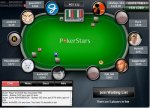PokerStars Responds to Double or Nothing Collusion Claims

 In a thread that was posted on TwoPlusTwo that has been referenced by many members of the online poker community, a collusion ring was identified on the PokerStars Double or Nothing, or DoN, tables. In late May, “Jane0123” posted that she had been banned from PokerStars for apparent cheating in PokerStars’ DoN games.
In a thread that was posted on TwoPlusTwo that has been referenced by many members of the online poker community, a collusion ring was identified on the PokerStars Double or Nothing, or DoN, tables. In late May, “Jane0123” posted that she had been banned from PokerStars for apparent cheating in PokerStars’ DoN games.
An e-mail sent by PokerStars staff to “Jane0123” noted, “In reviewing hands, it is clear that you routinely made team plays to create situations where you were supposed to benefit. You and your friends routinely played four and five players deep and squeezed the blinds between two or more cooperating players. After reviewing several hands, for several players, it became obvious that this was part of some kind of agreed-upon strategy.”
“Jane0123,” according to Sharkscope figures posted on TwoPlusTwo at the time of the incident, showed 11,766 sit and gos played, a profit of just over $56,000, a 5% ROI, and an $87 average stake. Text found on TwoPlusTwo added, “Players on the suspected colluder list dominate the Stars DoN leaderboards. ‘wudiyg,’ for example, was the top Stars DoN player for 2009 with $96,000 in profit.”
Arising in the thread was the notion that collusion at the DoN tables could be rather simple, as half of the field finishes in the money. It was revealed that PokerStars froze accounts related to the cheating, with its staff noting in an e-mail, “I can confirm that PokerStars identified a number of accounts earlier this year operating as part of a large collusion ring. Those accounts were closed and the funds therein seized recently.” The world’s largest online poker site was in the process of figuring out how to compensate players.
An e-mail sent from PokerStars Game Security to PocketFives.com explained that four key factors contributed to the site’s delayed response time: “The large number of accounts involved, the high volume of play by each player, the subtle collusion method used (avoidance), and the type of event played (Double or Nothings – where avoidance can often by misinterpreted as extremely tight passive play).” The e-mail went on to say that PokerStars has “introduced a new security function to prevent players from certain countries from playing in the same Double or Nothing events together.”
 On July 20th, PokerStars paid $1.53 million in compensation to players affected by the cheating ring from China. Overall, PokerStars has shelled out $2.1 million in compensation to players, but told PocketFives.com that the cheaters’ “net profit was $494,000. We believe that this level of compensation is fair and generous.” The $2.1 million consisted of rake paid by non-colluding players in games where collusion occurred ($747,000), the colluders’ profit, the colluders’ rake, and an extra $500,000 thrown in by PokerStars.
On July 20th, PokerStars paid $1.53 million in compensation to players affected by the cheating ring from China. Overall, PokerStars has shelled out $2.1 million in compensation to players, but told PocketFives.com that the cheaters’ “net profit was $494,000. We believe that this level of compensation is fair and generous.” The $2.1 million consisted of rake paid by non-colluding players in games where collusion occurred ($747,000), the colluders’ profit, the colluders’ rake, and an extra $500,000 thrown in by PokerStars.
In late June, PokerStars officials told posters on TwoPlusTwo that the site would not be able to reveal the correct user IDs associated with the collusion, citing the Data Protection Act of 2002 in the Isle of Man. Several members of the forum were unhappy with the lack of transparency as well as the amount distributed to them. One poster wrote, “PokerStars hosted games in which massive cheating took place for half a year, took several months more to deal with the situation, and is now repaying its defrauded customers only a small fraction of what they lost.”
On PocketFives.com, the outlook on PokerStars’ response was considerably better in a thread in Poker Discussion. PocketFives.com member fpdog remarked, “A+ to Stars security on this – makes you feel good about them as I noticed I got a real good refund… Keep up the good work Stars.”
Poker Starshas closed 38 accounts in the DoN collusion scandal, with the stakes affected ranging from $10 to $100. Site officials discovered the cheating in February and information on TwoPlusTwo revealed that the soft play primarily took place in December 2009 and January 2010.




